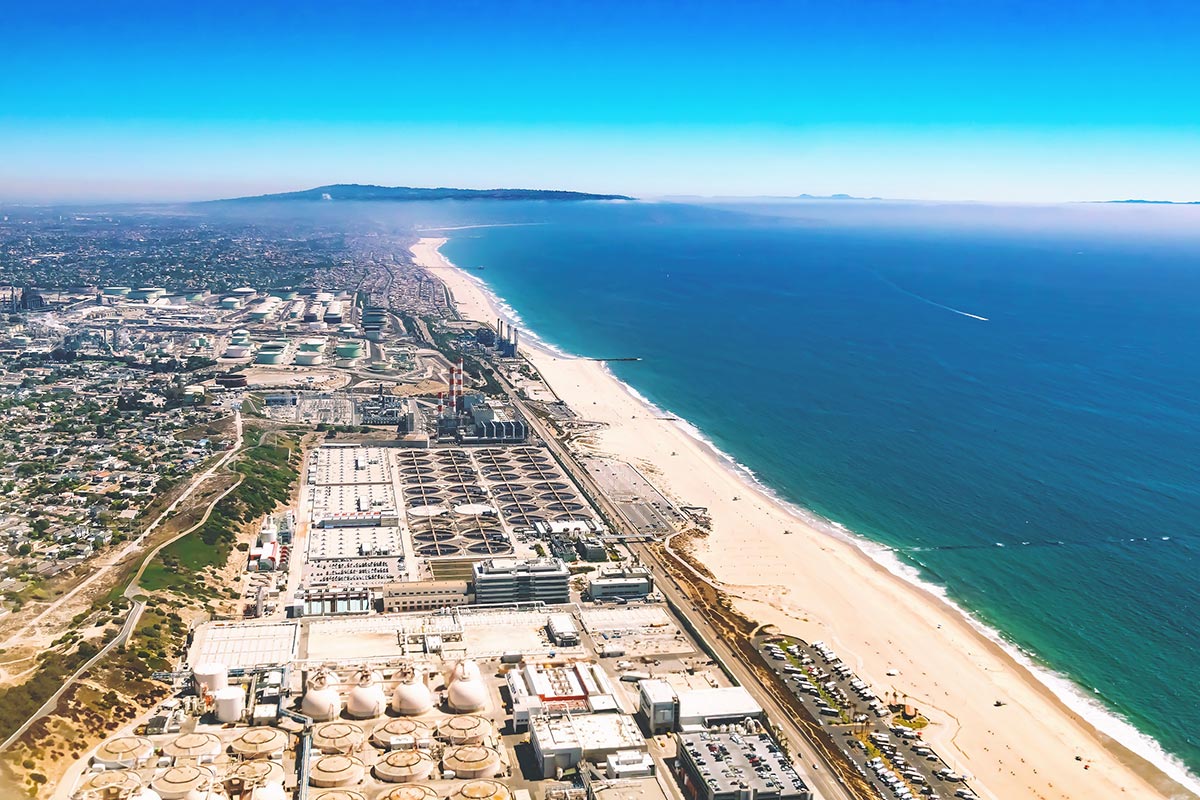
Hyperion water reclamation plant (Adobe stock)
The City of Los Angeles has agreed to pay a total of $20.8 million to fix issues at the Hyperion Water Reclamation Plant and to complete related environmental projects in connection with the discharge of millions of gallons of wastewater into Santa Monica Bay in 2021.
Hyperion, the City’s oldest and largest wastewater treatment facility, collects, treats, and disposes of wastewater for Los Angeles and several other municipalities, including Beverly Hills, Culver City, El Segundo, Santa Monica, San Fernando, and West Hollywood. Hyperion’s service area includes more than 4 million people.
Hyperion treats an average of 260 million gallons of wastewater per day, of which 225 million gallons are discharged through its 5-Mile Outfall to the Santa Monica Bay and 35 million gallons are conveyed to a water recycling facility for advanced treatment and reuse. Treatment of wastewater begins in a portion of the facility called the Headworks area, which involves the use of bar screens to remove large objects such as branches, plastics, and rags, from the entering wastewater.
“We in Southern California love our beaches and people in our community deserve clean waters free of contamination when they visit the beach,” said United States Attorney Martin Estrada. “This agreement requires the City to take concrete steps and commit substantial funds to improving the Hyperion facility and thereby prevent a disaster like this from reoccurring. Our office is committed to protecting our environment and we will continue to use our federal authority to ensure the safe use of our natural resources for future generations.”
In July 2021, the Headworks became inundated with debris, causing wastewater to flood that area. Hyperion’s relief system was triggered and approximately 12.5 million gallons of untreated wastewater was discharged through the Facility’s 1-Mile Outfall into the Santa Monica Bay. Offshore water quality testing and monitoring subsequently conducted around the 5-Mile Outfall showed exceedances of applicable water quality standards for total coliform bacteria, E. coli, and Enterococcus.
To resolve the U.S. Attorney’s criminal investigation, the City has agreed to spend no less than $20 million to perform and complete various projects at Hyperion, which the City agreed to perform under an Administrative Order On Consent previously issued by the EPA. That work includes improvements on Hyperion’s Distributed Control System, such as integrating bar screens, level sensors and other ancillary equipment, integrating the alarm or status screens software to remove the antiquated alarms, training Hyperion operators responsible for control room operations on the updates, and constructing high-level channel overflow manage improvements.
In addition, the City has agreed to continue and expand upon its water quality testing program in compliance with its permits and will add two additional water quality testing sites between Dockweiler Beach and King Harbor. The City will also complete its rapid bacteria testing study and seek accreditation from the U.S. Environmental Protection Agency so it can test for bacterial levels in ocean water on a more rapid basis. The City will also retain a qualified third-party auditor to conduct annual audits of Hyperion’s operations to determine whether it is in compliance with the work described above and the Clean Water Act
Finally, the City has agreed to perform a one-year community outreach service project in coordination with the Los Angeles Sanitation and Environmental Department and a nonprofit. That work will include meetings with local government officials and community members, developing an improved emergency communications plan, and coordinating educational outreach with residents and schools. The cost of the additional monitoring, rapid bacteria testing study, and the community outreach project is estimated to be no less than $800,000.
The United States Environmental Protection Agency Criminal Investigation Division is investigating this matter.
Assistant United States Attorneys Dennis Mitchell and Mark Williams of the Environmental Crimes and Consumer Protection Section, as well as Assistant United States Attorney Mack Jenkins, Chief of the Criminal Division, are prosecuting this case.